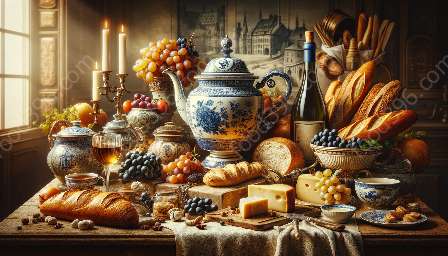French gastronomic culture is renowned worldwide for its exquisite flavors, meticulous techniques, and rich history. In order to truly understand the essence of French cuisine, it is essential to delve into the historical, cultural, and social influences that have shaped this culinary tradition.
French Cuisine History
French cuisine has a long and storied history that has been shaped by centuries of cultural exchange, regional diversity, and the influence of prominent chefs and culinary innovators. The roots of French gastronomy can be traced back to the medieval era, where the concept of fine dining and culinary refinement began to take root. Over time, French cuisine evolved and flourished, incorporating diverse influences from various regions and cultures.
Cuisine History
The history of cuisine itself is a fascinating journey that spans across different civilizations and epochs. From the ancient civilizations of Mesopotamia and Egypt to the elaborate banquets of the Roman Empire, the development of cuisine has been intertwined with the evolution of human societies. As trade routes expanded and empires rose and fell, culinary traditions and ingredients were exchanged and adapted, leading to the creation of new and innovative dishes.
The Origins of French Gastronomic Culture
The origins of French gastronomic culture can be traced back to the Middle Ages, when French nobility and the clergy began to refine and elevate the culinary arts. The noble class developed a taste for elaborate feasts and luxurious banquets, which led to the emergence of skilled chefs and the creation of intricate and sumptuous dishes. During this period, culinary techniques such as roasting, stewing, and baking were honed, and the use of exotic spices and ingredients became increasingly prevalent.
The Influence of Royalty and Aristocracy
Throughout the Renaissance and Enlightenment periods, French gastronomic culture continued to evolve, with the royal court and aristocracy playing a central role in shaping culinary trends. The rise of prominent royal chefs and the establishment of culinary schools further contributed to the refinement and codification of French cuisine. The court of Louis XIV, in particular, was instrumental in popularizing French culinary techniques and establishing the foundations of modern gastronomy.
Revolutionary Changes and Innovation
The French Revolution marked a significant turning point in the history of French gastronomic culture. The overthrow of the monarchy and the rise of the French Republic brought about profound social and cultural changes, including a reevaluation of culinary traditions. The revolution also led to the closure of aristocratic kitchens and the dispersal of skilled chefs, ultimately democratizing the culinary landscape and sparking a wave of innovation and creativity in the world of French cuisine.
Regional Diversity and Culinary Traditions
One of the most distinctive features of French gastronomic culture is its remarkable regional diversity. The different regions of France boast their own unique culinary traditions, ingredients, and flavors, reflecting the geographical, climatic, and cultural diversity of the country. From the rich seafood dishes of Brittany to the hearty stews of Provence and the world-renowned wines of Bordeaux and Burgundy, each region contributes to the vibrant tapestry of French cuisine.
The Influence of French Cuisine on the World
The influence of French gastronomic culture extends far beyond the borders of France, shaping global culinary trends and traditions. French culinary techniques, such as sautéing, braising, and pastry-making, have become fundamental pillars of Western cuisine. Moreover, French chefs and restaurants have been at the forefront of culinary innovation, continually pushing the boundaries of taste and creativity.
The Future of French Gastronomy
As we look to the future, the legacy of French gastronomy continues to inspire chefs and food enthusiasts around the world. The enduring appeal of French cuisine lies in its dedication to quality, tradition, and innovation. By embracing the rich heritage and gastronomic values of French culinary tradition, we ensure that its legacy will endure for generations to come.

